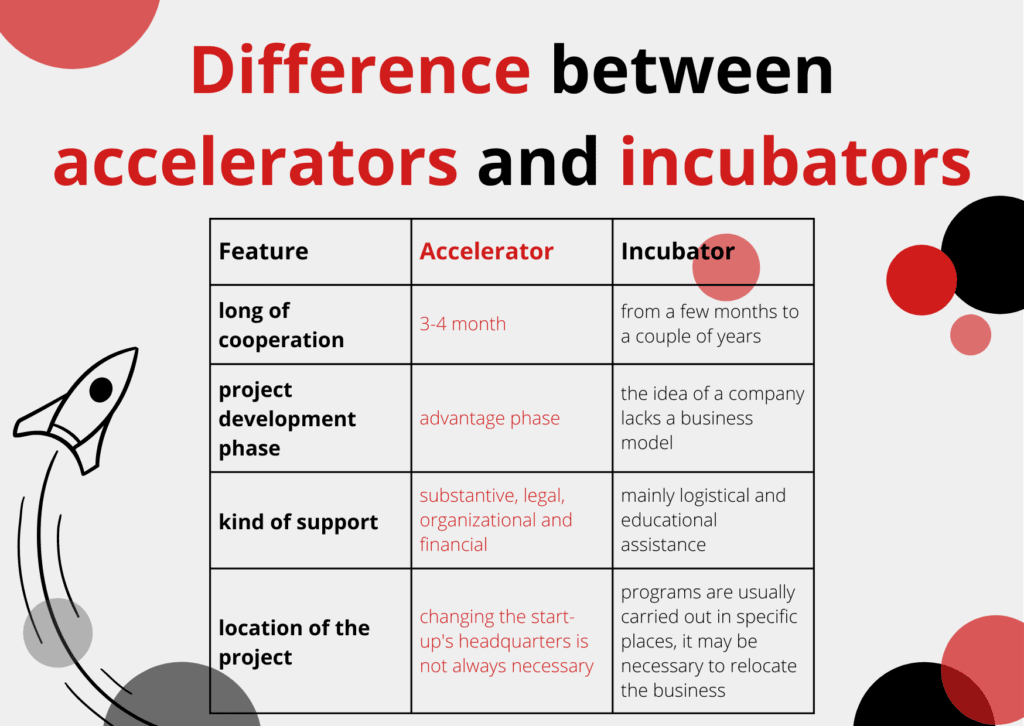There is a common saying that the most difficult thing to do is just to start and take a big first step. In the reality of startups, the idea and the first step are merely the beginning of a successful business adventure. In the second phase of development, startups may seek the assistance of incubators and business accelerators.
Our previous article is about insights into how business incubators operate. Today, we will focus on the second group of institutions that can aid you in developing your company.
Business accelerators – how it works?
Business accelerators are supportive programs designed for entrepreneurs, aiming to assist them in establishing and operating their own companies. While similar to business incubators, accelerators have distinct methods of operation.
These institutions provide entrepreneurs with substantial support, both in terms of legal and organizational aspects. One of the main advantages of accelerators is their streamlined application process, efficient work methods, and fostering of friendly relationships between mentors and CEOs.
The primary focus of accelerators is on providing mentoring support. They offer valuable advice and guidance to startups, both in their current activities and in anticipating and preventing potential crises. The ultimate goal of accelerators is to propel the development of companies, enabling them to gain momentum and succeed in the market.
By utilizing accelerators, startups can benefit from the right dynamics and gain a competitive edge that increases their chances of survival and success in the market.
Solution for who’s?
Accelerators are indeed geared towards startups or companies in the pre-seed phase with specific business ideas. These institutions are more suitable for individuals who have a clear vision and direction for their business. In contrast to incubators, accelerators may have stricter guidelines and less flexibility for changing or upgrading the company concept. Startups must meet certain criteria to be accepted into an accelerator program.
If you have an idea for a company and want to start a business, utilizing a business accelerator can provide significant support in tackling various challenges. By choosing to work with an accelerator, you can alleviate concerns about funding and the lack of knowledge in running a business. Accelerators offer valuable expertise in providing financial support during the initial stages of setting up a company. They also assist in navigating the complexities of starting a business, completing necessary formalities, providing legal assistance, and granting access to beneficial programs, servers, and applications that enhance the company’s operations.

Difference between accelerators and incubators
Incubators and accelerators may seem similar, but they have some key differences:
| Feature | Accelerator | Incubator |
| long of cooperation | 3-4 month | from a few months to a couple of years |
| project development phase | advantage phase | the idea of a company lacks a business model |
| kind of support | substantive, legal, organizational and financial | mainly logistical and educational assistance |
| location of the project | changing the start-up’s headquarters is not always necessary | programs are usually carried out in specific places, it may be necessary to relocate the business |
What to look for when choosing a business accelerator?
Choosing the right accelerator is really important. That’s why before the decision is good to look up some aspects:
- A portfolio of startups: Assessing the portfolio of startups that have participated in the accelerator program can provide insights into the value they gained from the collaboration. It helps determine if the accelerator has a track record of supporting successful and sustainable startups.
- The survival rate of startups: Understanding the survival rate of startups from the accelerator’s portfolio is important. This involves examining the ratio of startups that remain active in the market versus those that become inactive within a year, two years, or three years after the end of the acceleration program. A higher survival rate indicates the effectiveness of the accelerator’s support.
- Level of satisfaction: Evaluating the level of satisfaction among startups that have completed the accelerator program can give valuable insights. This includes determining if startups would choose to work with the accelerator again, indicating their satisfaction with the support and experience provided.
It’s essential to note that accelerators are most suitable for companies and startups that have a clear purpose and a well-defined business plan. Before selecting an accelerator, conducting thorough research and gathering more information about the institution is highly recommended.
If you’re interested in learning more about incubators, you can check out our latest article. Additionally, we have recently launched the Startup Stories podcast, featuring interviews with CEOs of various startups. Feel free to click here if you’d like to gain insights from their points of view.
